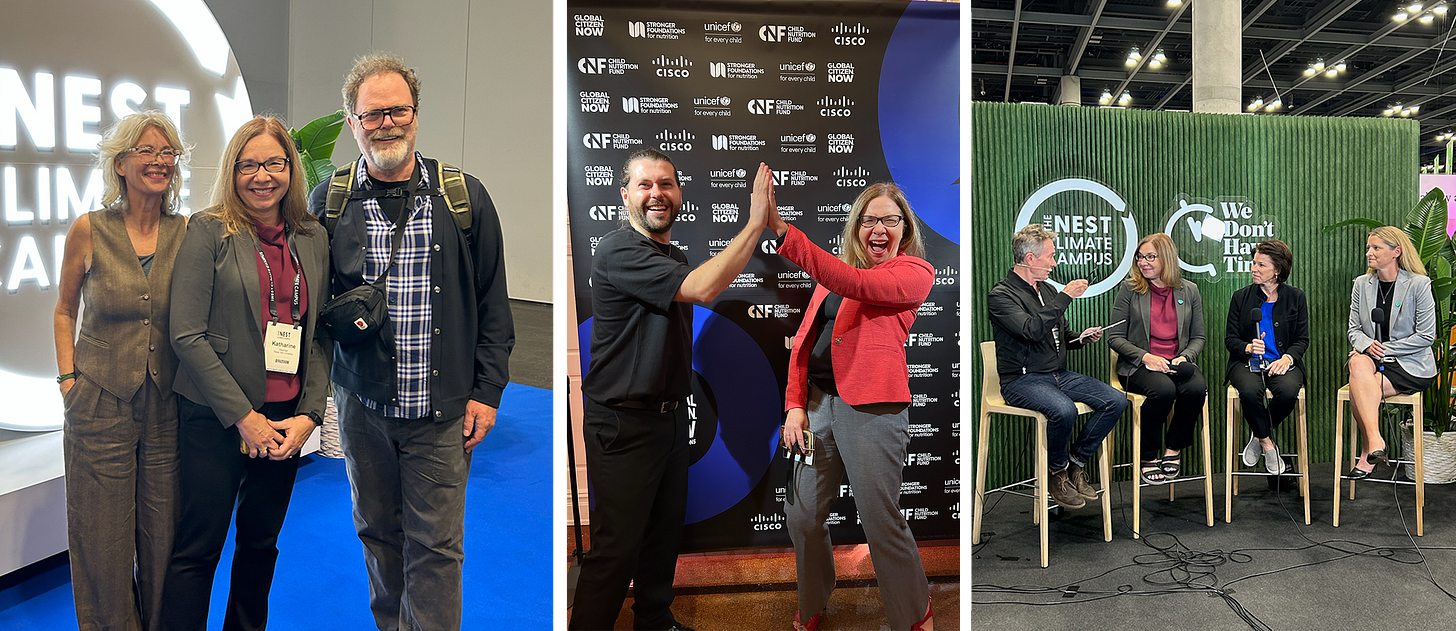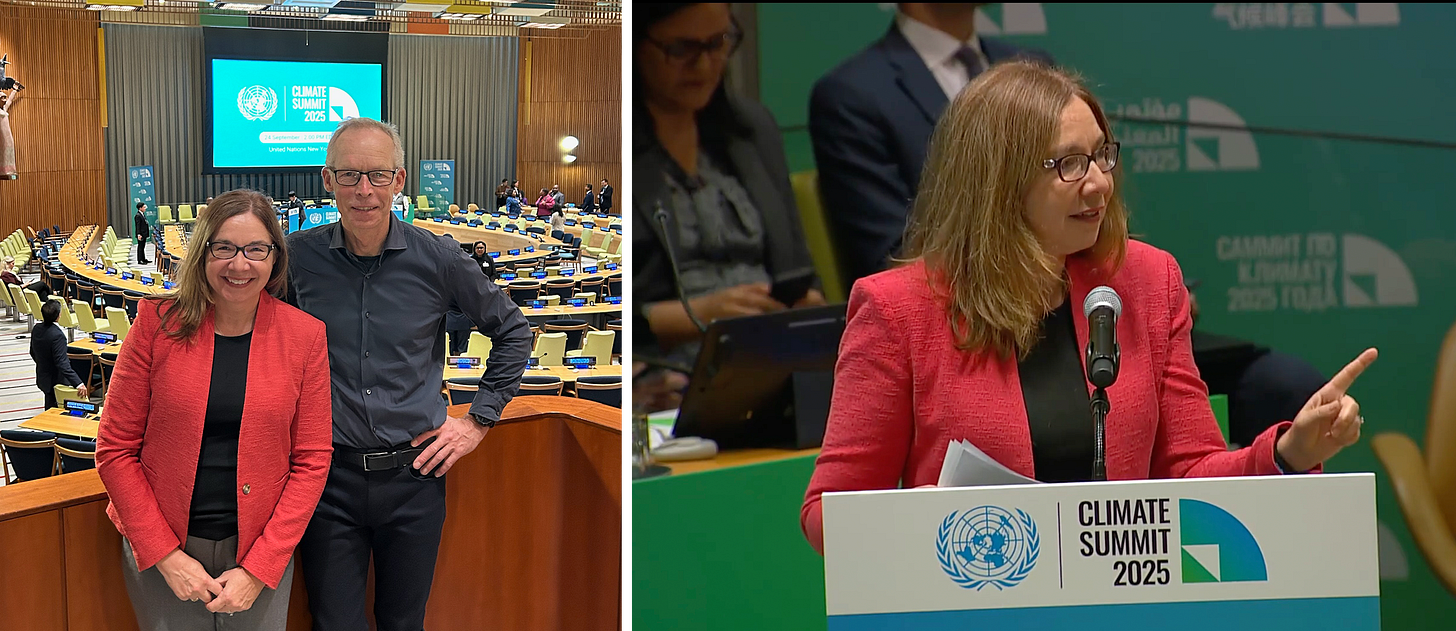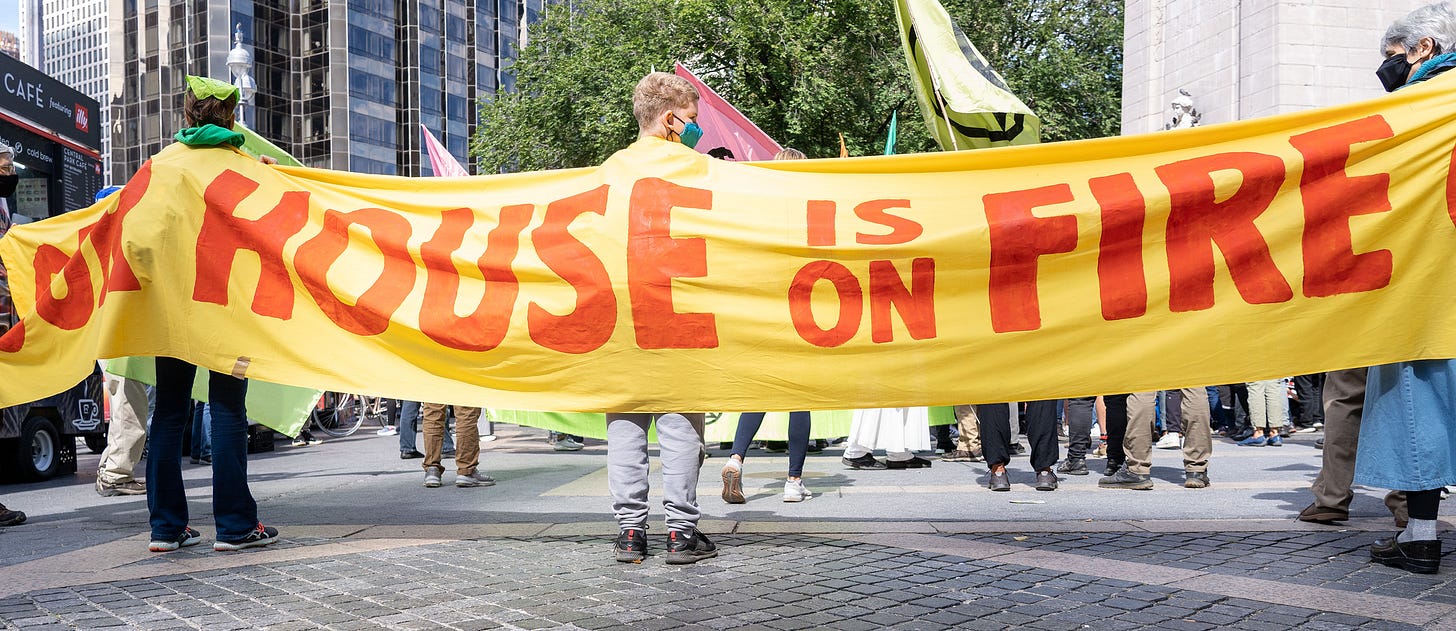Climate action can't wait
NYC Climate Week: The world leans in, the U.S. checks out, and how to SHIFT into action
I spent this past week in New York City, attending Climate Week and the UN General Assembly. For the last ten years, I’ve given the majority of my talks virtually and when I travel in person, I always try to bundle as many events as possible to make every ounce of carbon and hour of time count. With over a thousand registered events (and thousands more meetings), Climate Week made that easy. All told, I participated in 48 meetings, events, talks, panels, receptions, meals, and interviews during my five and a half days there!
The one event I had to miss -- because my hosts were worried the security line to get into the UN would take too long -- was very sadly what turned out to be one of Dr. Jane Goodall’s final talks. Her perspective on hope and how individuals can have impact have long guided my own approaches to science advocacy. While the world has lost its most powerful advocate for nature, I know her words and mission will live on.
On Wednesday last week, I had the opportunity to address heads of state at the UN Secretary-General’s Climate Summit, along with my colleague Johan Rockström, a sustainability scientist who pioneered the concept of planetary boundaries. At this event, countries presented their latest national climate commitments. You can watch a video of our addresses here, and the response of world leaders, beginning at the four-minute mark.
Other events I attended ranged from a climate education workshop hosted by the American Museum of Natural History to a dinner with scriptwriters and producers in the entertainment industry. But no matter where I was or who I was speaking with, each Climate Week event offered a chance to hear innovative ideas, renew connections with friends and colleagues, and forge new collaborations.

I was most encouraged by seeing, everywhere I went, how many others share the same conviction I do. The challenges before us are immense, but the global community working together to meet them grows larger and more determined every day. That spirit of collaboration and determination shone through in every conversation I had, reminding me that real progress is not only possible—it’s already underway.
While the U.S. has backtracked on climate action this year, the rest of the world showed up last week to confirm they remain committed to meaningful action. At last Wednesday’s UN climate summit, the biggest news came when China’s Xi Jinping announced his country would cut its greenhouse emissions by 7 to 10 percent over the next decade. Although the Biden administration had pushed China to adopt 30 percent emissions cuts from peak last year, this is the country’s strongest pledge to date. “Green and low carbon transition is the trend of our time,” Xi said.
At the Wednesday UN event, over 100 nations made emissions reductions pledges, the AP reported. This includes Pacific Island nations that are already at net negative emissions, as their ecosystems take up more than they generate. Even still, they are continuing to cut their emissions, as they know the science says that “every bit of warming counts.”
At another Climate Week event, Simon Stiell, Executive Secretary of the UN Framework Convention on Climate Change, pointed out that clean energy investment hit $2 trillion worldwide in 2024.
“The good news is we’re not waiting for miracles. The economics are on our side,” he said. “Today, over 90 percent of new renewables cost less than the cheapest new fossil option. The technologies and solutions already exist. Clean power, electrification, efficiency and storage, resilience-building. The toolkit is there and being put to work.”
The elephant in every room last week was the backtracking the United States has done on climate at the national level this year. “There are few issues on which the United States is more diplomatically isolated from the rest of the world than climate change,” the New York Times wrote. In his speech before the United Nations General Assembly, President Donald Trump called climate change “the greatest con job ever perpetrated on the world” and renewables a “green energy scam.” At one event, U.S. Energy Secretary Chris Wright even called on other nations to follow America’s lead and drop out of the Paris Agreement.
Wopke Hoekstra, the European Union climate commissioner, minced no words in an interview with the Times over the new direction the U.S. is taking on climate. “The world’s most phenomenal geopolitical player, its largest economy, its second largest emitter, is basically checking out,” he said.
The U.S. already suffers more insured losses from extreme weather and climate disasters than any other country. As climate change accelerates and its impact on extreme weather worsens, these economic costs will continue to rise. But this isn’t just about avoiding the most dangerous impacts—it’s also about deciding who will lead the world into a clean energy future.
As I’ve shared before, China has installed more solar in a single year than the U.S. has in its entire history, and its clean energy technology exports alone reduced global emissions by 1% last year. Per capita, however, it’s E.U. countries that have made the biggest jumps in wind and solar energy over the last few years. This list is topped by Finland, closely followed by Sweden, the Netherlands, Denmark and Lithuania.
The E.U. is also the biggest contributor to climate finance in developing countries, and many of those countries are moving quickly into a clean energy future. Last year, for example, Pakistan installed more solar than Canada has in its entire history; and this year, the continent of Africa set a new record for solar panel imports. As the world moves ahead, the U.S. increasingly risks falling behind.
I am super-excited this week to announce a fantastic new resource for climate action! One of my favourite organizations, Project Drawdown, in collaboration with Dr. Kimberly Nicholas, my long-time colleague at Lund University, have launched an interactive guide. It’s called SHIFT, which stands for the Super High-Impact Initiative for Fixing Tomorrow.
SHIFT is centered around five science-based climate superpowers that enable you, as a citizen, professional, investor, consumer, or role model, to make personal choices that then translate into collective action. In just a few clicks, SHIFT helps you discover your “climate superpower!”
How does it work? The website asks you a series of simple questions about where you live, your level of education, your yearly income and more. Then, it recommends a series of actions you can take. The guide clearly describes actions you can take, quantifies the impact such actions can have, and points you towards other resources that can help you act more effectively.
Too often, tools like this focus exclusively on your individual carbon footprint and ignore how powerful our voices can be in catalyzing change. SHIFT doesn’t make that mistake: it’s one of the most accurate tools I have ever come across. For example, as a citizen of a democracy, one of the most impactful actions available to you is voting for candidates who are committed to real climate action.
Check it out and let me know whether and how it helps you become a more effective advocate for climate action!
Thurs-Fri Oct 2-3 - “Raising Hope Conference for the Tenth Anniversary of Laudato Si.“ I’m honoured to participate in a celebration of hope for our shared hope, led by Pope Leo. Register to view the livestream and recording here.










When I read that Pacific Island nations were further cutting emissions despite already being net negative, because every bit of warming counts, I teared up!
How can we in the West not be shamed and then inspired by their selflessness? How can it not spur us, the ones actually causing the problem, to action?
Thanks for sharing the link to SHIFT to get educated about how I’m contributing and how I can help.